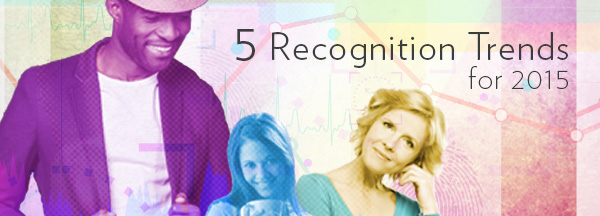
In our 5 Recognition Trends for 2015 eBook, we share our employee recognition insights and what your organization can do to see results. This post is the fourth installment of a five-part blog series covering each trend and its effect on employee engagement.
Trend No. 4 — Employees want recognition to be a personal experience
Employee recognition continues to be a hot topic amongst organizational leadership. The recognition moment of twenty years ago is not the same as today, and neither are the people in your company. The workforce of today demands more from the company recognition program.
Employees expect their recognition program to be as good as, if not better than, their consumer experiences. From the particular person delivering the message to the types of gifts they can select, employees are looking for a personal and meaningful recognition moment. If it feels like employers aren’t offering programs that fit who they are, your employees could feel like they may not fit, either.
Making recognition personal is surprisingly uncomplicated.
How well do you know your employees? When was the last time you talked to your people about being recognized? Companies that are actively learning about their employees have the advantage of achieving greater success.
- Start by asking your population for feedback. It can be as easy as releasing a company survey. The type of information you collect can provide a consensus on recognition needs and wants. Questions should range the entire process - from where recognition takes place down to the gifts employees can select.
- The manager-employee relationship can forge some of the most useful feedback. Managers have a unique advantage; they work on a daily basis with their people. When you utilize one-on-one conversations to discuss recognition preferences, you can find out interesting personal needs. For example, some employees like to have their contributions shared publicly, in front of a larger group or at a meeting. Others prefer that their achievements be acknowledged in a private discussion.
- Having an understanding of generational knowledge can also provide valuable insight to employee needs as a whole. The likes and dislikes of the five generations in the workforce are as unique as the individual:
Personal recognition is not just adding the employee's name on a certificate or email; it's so much more. It is most effective when you take into consideration the preferences of the individual and adjust the style and method of your appreciation to their specific needs.
Whether your organization has a formal or informal recognition program, understanding your employees will be essential. Simply ask them how they’d like to be recognized for a job well done and listen to them in any way you can. They’ll appreciate the personal thought, which drives engagement and fosters The Recognition Experience®.

